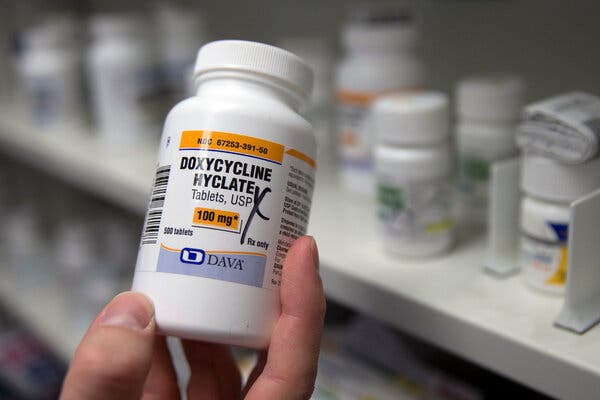Infection
A New Way to Prevent S.T.I.s: A Pill After Sex
The News
In a bid to stem the resurgence of sexually transmitted infections, the Centers for Disease Control and Prevention plans to recommend doxycycline, a widely used antibiotic, for use after an unprotected sexual encounter.
The antibiotic would be taken only by gay and bisexual men and transgender women who have had an S.T.I. within the previous year or who may be at risk for one. The scientific evidence is too limited to recommend the strategy, called doxy-PEP, to all people who might be exposed to infection-causing bacteria during sex.
The agency released draft guidelines on Monday and plans to finalize them after a 45-day public comment period.
Why It Matters: Rates of S.T.I.s are skyrocketing.
In 2021, there were 1.6 million cases of chlamydia, more than 700,000 cases of gonorrhea and nearly 177,000 cases of syphilis in the United States, together tallying up to $1.1 billion in direct medical costs. (Rates of babies born with syphilis also soared that year, with nearly 3,000 affected.)
All three S.T.I.s are caused by bacteria and are easily treated with antibiotics. But the closure of sexual health clinics across the country and a drop in public awareness has contributed to a sharp rise in infections.
Gonorrhea cases have increased 118 percent since a historical low in 2009, according to the C.D.C. Syphilis was nearly eliminated in the United States about 20 years ago, but cases have risen 74 percent since 2017.
On any given day in 2018, about one in five Americans had an S.T.I., the C.D.C. has estimated.
“We need game-changing innovations to turn the S.T.I. epidemic around, and this is a major step in the right direction,” Dr. Jonathan Mermin, director of the agency’s National Center for H.I.V., Viral Hepatitis, S.T.D. and TB Prevention, said in an emailed statement.
Background: Doxycycline is a powerful deterrent of infection.
The C.D.C.’s guidelines are based on studies that show that a single dose of doxycycline taken within 72 hours of unprotected sex dramatically cuts the risk of the infections.
Evidence from emerging research was compelling enough that clinics in some cities, such as San Francisco, have been offering doxy-PEP to those at high risk of infection for months. Generally, patients are given a supply of pills and told to take one within three days of an encounter during which they might have become infected.
But rates of S.T.I.s are highest among Black people and Native Americans, who are often those with the least access to health care. “No prevention tool — no matter how powerful — will change the S.T.I. epidemic if it doesn’t reach the people who need it most,” Dr. Mermin said.
What Critics Say: Wider antibiotic use may pose risks.
Doxycycline has been in use for decades, and there are few indications that bacteria have become resistant to it. Syphilis and chlamydia do not often develop resistance, but gonorrhea is another question: Those bacteria have become resistant to multiple classes of antibiotics.
Still, the picture may change depending on how many people take doxy-PEP and how often, some experts cautioned.
“At the population level, that does worry me,” said Antón Castellanos Usigli, a sexual health expert who is an adjunct lecturer at the Columbia Mailman School of Health.
In places like his native Mexico, Dr. Castellanos Usigli said, indiscriminate use of antibiotics has fueled the rise of drug-resistant bacteria, which can alter a person’s gut microbiome.
What Happens Next: The C.D.C. will finalize new guidelines.
Evidence so far supports doxy-PEP’s use only in men who have sex with men and in transgender women. In those groups, the antibiotic cut rates of syphilis and chlamydia by about 90 percent and gonorrhea by about 55 percent.
Men who have sex with men account for nearly half of reported syphilis cases, according to the C.D.C. If studies show the approach to be effective in heterosexual cisgender men and cisgender women, the guidelines may be expanded.
The agency said doctors should prescribe doxy-PEP as part of a comprehensive sexual health program that includes counseling, screening and treatment for the infections and for H.I.V.
“Doxy-PEP will be a good option for some patients,” Dr. Castellanos Usigli said. “But we will have to do a lot of education with medical providers and patients so that we target the best candidates and prevent misuse and overuse.”

